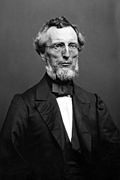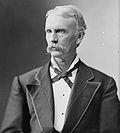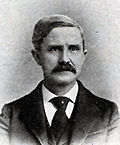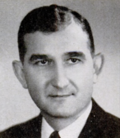| Representative | Party | Years | Cong
ress | Electoral history |
|---|
| District created March 4, 1843 |

John Pettit
(Lafayette) | Democratic | March 4, 1843 –
March 3, 1849 | 28th
29th
30th | Elected in 1843.
Re-elected in 1845.
Re-elected in 1847.
Lost renomination. |

Joseph E. McDonald
(Crawfordsville) | Democratic | March 4, 1849 –
March 3, 1851 | 31st | Elected in 1849.
Retired. |

Daniel Mace
(Lafayette) | Democratic | March 4, 1851 –
March 3, 1855 | 32nd
33rd
34th | Elected in 1851.
Re-elected in 1852.
Re-elected in 1854.
Retired. |
| People's | March 4, 1855 –
March 3, 1857 |

James Wilson
(Crawfordsville) | Republican | March 4, 1857 –
March 3, 1861 | 35th
36th | Elected in 1856.
Re-elected in 1858.
Retired. |

Albert S. White
(Stockwell) | Republican | March 4, 1861 –
March 3, 1863 | 37th | Elected in 1860.
Retired. |

Godlove S. Orth
(Lafayette) | Republican | March 4, 1863 –
March 3, 1869 | 38th
39th
40th | Elected in 1862.
Re-elected in 1864.
Re-elected in 1866.
Redistricted to the 7th district . |

James N. Tyner
(Peru) | Republican | March 4, 1869 –
March 3, 1875 | 41st
42nd
43rd | Elected to the term left vacant by the resignation of Representative-elect Daniel D. Pratt.
Re-elected in 1870.
Re-elected in 1872.
Lost renomination. |

Morton C. Hunter
(Bloomington) | Republican | March 4, 1875 –
March 3, 1879 | 44th
45th | Redistricted from the 6th district and re-elected in 1874.
Re-elected in 1876.
Lost re-election. |

Abraham J. Hostetler
(Bedford) | Democratic | March 4, 1879 –
March 3, 1881 | 46th | Elected in 1878.
Retired. |

Robert B. F. Peirce
(Crawfordsville) | Republican | March 4, 1881 –
March 3, 1883 | 47th | Elected in 1880.
Lost re-election. |

John E. Lamb
(Terre Haute) | Democratic | March 4, 1883 –
March 3, 1885 | 48th | Elected in 1882.
Lost re-election. |

James T. Johnston
(Rockville) | Republican | March 4, 1885 –
March 3, 1889 | 49th
50th | Elected in 1884.
Re-elected in 1886.
Lost re-election. |

Elijah V. Brookshire
(Crawfordsville) | Democratic | March 4, 1889 –
March 3, 1895 | 51st
52nd
53rd | Elected in 1888.
Re-elected in 1890.
Re-elected in 1892.
Lost re-election. |

George W. Faris
(Terre Haute) | Republican | March 4, 1895 –
March 3, 1897 | 54th | Elected in 1894.
Redistricted to the 5th district . |

Charles L. Henry
(Anderson) | Republican | March 4, 1897 –
March 3, 1899 | 55th | Redistricted from the 7th district and re-elected in 1896.
Retired. |

George W. Cromer
(Muncie) | Republican | March 4, 1899 –
March 3, 1907 | 56th
57th
58th
59th | Elected in 1898.
Re-elected in 1900.
Re-elected in 1902.
Re-elected in 1904.
Lost re-election. |

John A. M. Adair
(Portland) | Democratic | March 4, 1907 –
March 3, 1917 | 60th
61st
62nd
63rd
64th | Elected in 1906.
Re-elected in 1908.
Re-elected in 1910.
Re-elected in 1912.
Re-elected in 1914.
Retired to run for Governor of Indiana. |

Albert H. Vestal
(Anderson) | Republican | March 4, 1917 –
April 1, 1932 | 65th
66th
67th
68th
69th
70th
71st
72nd | Elected in 1916.
Re-elected in 1918.
Re-elected in 1920.
Re-elected in 1922.
Re-elected in 1924.
Re-elected in 1926.
Re-elected in 1928.
Re-elected in 1930.
Died. |
| Vacant | April 1, 1932 –
March 3, 1933 | 72nd | |

John W. Boehne Jr.
(Evansville) | Democratic | March 4, 1933 –
January 3, 1943 | 73rd
74th
75th
76th
77th | Redistricted from the 1st district and re-elected in 1932.
Re-elected in 1934.
Re-elected in 1936.
Re-elected in 1938.
Re-elected in 1940.
Lost re-election. |

Charles M. La Follette
(Evansville) | Republican | January 3, 1943 –
January 3, 1947 | 78th
79th | Elected in 1942.
Re-elected in 1944.
Retired to run for U.S. Senator. |

E. A. Mitchell
(Evansville) | Republican | January 3, 1947 –
January 3, 1949 | 80th | Elected in 1946.
Lost re-election. |

Winfield K. Denton
(Evansville) | Democratic | January 3, 1949 –
January 3, 1953 | 81st
82nd | Elected in 1948.
Re-elected in 1950.
Lost re-election. |

D. Bailey Merrill
(Evansville) | Republican | January 3, 1953 –
January 3, 1955 | 83rd | Elected in 1952.
Lost re-election. |

Winfield K. Denton
(Evansville) | Democratic | January 3, 1955 –
December 30, 1966 | 84th
85th
86th
87th
88th
89th | Elected in 1954.
Re-elected in 1956.
Re-elected in 1958.
Re-elected in 1960.
Re-elected in 1962.
Re-elected in 1964.
Lost re-election and resigned early. |
| Vacant | December 30, 1966 –
January 3, 1967 | 89th | |

Roger H. Zion
(Evansville) | Republican | January 3, 1967 –
January 3, 1975 | 90th
91st
92nd
93rd | Elected in 1966.
Re-elected in 1968.
Re-elected in 1970.
Re-elected in 1972.
Lost re-election. |

Philip H. Hayes
(Evansville) | Democratic | January 3, 1975 –
January 3, 1977 | 94th | Elected in 1974.
Retired to run for U.S. Senator. |

David L. Cornwell
(Paoli) | Democratic | January 3, 1977 –
January 3, 1979 | 95th | Elected in 1976.
Lost re-election. |

H. Joel Deckard
(Evansville) | Republican | January 3, 1979 –
January 3, 1983 | 96th
97th | Elected in 1978.
Re-elected in 1980.
Lost re-election. |

Frank McCloskey
(Bloomington) | Democratic | January 3, 1983 –
January 3, 1985 | 98th | Elected in 1982.
Seat left vacant while election contest resolved. |
| Vacant | January 3, 1985 –
May 1, 1985 | 99th | Election contested and the House of Representatives refused to seat anyone. |

Frank McCloskey
(Smithville) | Democratic | May 1, 1985 –
January 3, 1995 | 99th
100th
101st
102nd
103rd | Re-elected in 1985.
Re-elected in 1986.
Re-elected in 1988.
Re-elected in 1990.
Re-elected in 1992
Lost re-election. |

John Hostettler
(Blairsville) | Republican | January 3, 1995 –
January 3, 2007 | 104th
105th
106th
107th
108th
109th | Elected in 1994.
Re-elected in 1996.
Re-elected in 1998.
Re-elected in 2000.
Re-elected in 2002.
Re-elected in 2004.
Lost re-election. |

Brad Ellsworth
(Evansville) | Democratic | January 3, 2007 –
January 3, 2011 | 110th
111th | Elected in 2006.
Re-elected in 2008.
Retired to run for U.S. Senator. |

Larry Bucshon
(Evansville) | Republican | January 3, 2011 –
January 3, 2025 | 112th
113th
114th
115th
116th
117th
118th | Elected in 2010.
Re-elected in 2012.
Re-elected in 2014.
Re-elected in 2016.
Re-elected in 2018.
Re-elected in 2020.
Re-elected in 2022.
Retired. |

Mark Messmer
(Jasper) | Republican | January 3, 2025–
present | 119th | Elected in 2024. |



































